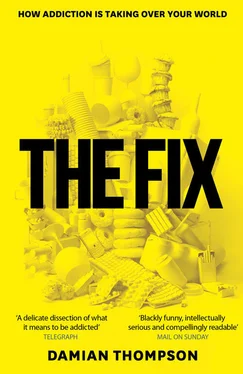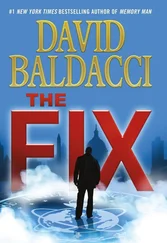1 ...6 7 8 10 11 12 ...19 This is just a guess, but it wouldn’t surprise me if, all over America, clued-up Vicodin users are already telling their doctors that their pain is getting worse and maybe they could use something a little stronger …
The addictive qualities of cupcakes, iPhones and Vicodin aren’t immediately obvious. Someone encountering a cupcake for the first time since childhood doesn’t think: uh-oh, I’d better be careful not to develop a sugar addition that triggers an eating disorder and end up washing the sick out of my hair. Likewise, people buying their first smartphone don’t worry about developing an obsessive-compulsive relationship with a computer game, and until recently the recreational use of painkillers was almost unheard of. In other words, as unqualified consumers we’re increasingly tempted by products about whose effect on our brain we know virtually nothing. We may not even notice the burst of tension-relieving pleasure they provide – at least, not until we realise that we can’t live without them.
Using substances and manipulating situations to fix your mood isn’t new. It’s the pace, intensity, range and scale of this mood-fixing that is unprecedented, irrespective of whether it involves drugs, alcohol, food or sex.
Put simply, both our need and our ability to manipulate our feelings are growing. We’re always searching for new ways to change the way we feel because, to state the obvious, we’re not at ease with ourselves. That’s a very broad-brush statement, so let me try to be more specific. Our ancestors were unable to insulate themselves from fear and despair in the way that we try to: certain forms of unhappiness, such as grief at the death of children, were more familiar to them than they are to us. Nor did they possess many fixes to address those feelings – and, in any case, experiences of such intensity aren’t easily fixed, even in the short term. We, on the other hand, struggle with small but inexorable and cumulative pressures in our daily lives. These produce a free-floating anxiety that is susceptible to short-term fixes.
The hi-tech world that ratchets up the pressure on us also yields scientific discoveries that speed up the flow of pleasure-giving and performance-enhancing chemicals in our brains. Indeed, producers and consumers collude vigorously in this process, which helps us cope with commitments that we feel are beyond our control. (Note, incidentally, how the verb ‘to cope’ has invaded so many areas of human activity: sometimes it seems that we need a ‘coping strategy’ just to go to the bathroom.) The jokey phrase ‘retail therapy’ has entered the language for a good reason. We, as consumers, know that the instant gratification of a purchase goes beyond simple pleasure at acquiring something new – it can change the way we feel about everything, albeit only for a short time. Manufacturers are well aware of it, too. They know they are the purveyors of fixes, and that the moment their fixes fail is the moment they start losing market share.
The problem is that these increasingly complex interactions between producers and consumers are also increasingly unpredictable, especially in their effects on the human body. It’s not possible to predict with any accuracy the sorts of relationships that people will form with the substances and experiences thrust at them. Neuroscientists are learning new things about our reward systems all the time, but they’ll admit privately that the attempt to turn these discoveries into drugs that target specific mental disorders have been shockingly hit-and-miss. Meanwhile, the rest of us know only one thing about those reward systems: how to stimulate them.
In other words, we are sitting in front of the controls of a machine whose workings are basically a mystery to us. And someone has just handed us the ignition keys.
2 CONTENTS Title Page DAMIAN THOMPSON THE FIX HOW ADDICTION IS INVADING OUR LIVES AND TAKING OVER YOUR WORLD 1 - CUPCAKES, IPHONES AND VICODIN 2 - IS ADDICTION REALLY A ‘DISEASE’? 3 - WHAT THE BRAIN TELLS US (AND WHAT IT DOESN’T) 4 - ENTER THE FIX 5 - WHY CAKE IS THE NEW COKE 6 - HAPPY HOUR 7 - DRUGSTORE COWBOYS 8 - GAMING, THE NEW GAMBLING 9 - REDISCOVERING PORN 10 - DELIVER US FROM TEMPTATION ACKNOWLEDGEMENTS NOTES Конец ознакомительного фрагмента. Текст предоставлен ООО «ЛитРес». Прочитайте эту книгу целиком, купив полную легальную версию на ЛитРес. Безопасно оплатить книгу можно банковской картой Visa, MasterCard, Maestro, со счета мобильного телефона, с платежного терминала, в салоне МТС или Связной, через PayPal, WebMoney, Яндекс.Деньги, QIWI Кошелек, бонусными картами или другим удобным Вам способом. Copyright Конец ознакомительного фрагмента. Текст предоставлен ООО «ЛитРес». Прочитайте эту книгу целиком, купив полную легальную версию на ЛитРес. Безопасно оплатить книгу можно банковской картой Visa, MasterCard, Maestro, со счета мобильного телефона, с платежного терминала, в салоне МТС или Связной, через PayPal, WebMoney, Яндекс.Деньги, QIWI Кошелек, бонусными картами или другим удобным Вам способом. About the Publisher
IS ADDICTION REALLY A ‘DISEASE’? CONTENTS Title Page DAMIAN THOMPSON THE FIX HOW ADDICTION IS INVADING OUR LIVES AND TAKING OVER YOUR WORLD 1 - CUPCAKES, IPHONES AND VICODIN 2 - IS ADDICTION REALLY A ‘DISEASE’? 3 - WHAT THE BRAIN TELLS US (AND WHAT IT DOESN’T) 4 - ENTER THE FIX 5 - WHY CAKE IS THE NEW COKE 6 - HAPPY HOUR 7 - DRUGSTORE COWBOYS 8 - GAMING, THE NEW GAMBLING 9 - REDISCOVERING PORN 10 - DELIVER US FROM TEMPTATION ACKNOWLEDGEMENTS NOTES Конец ознакомительного фрагмента. Текст предоставлен ООО «ЛитРес». Прочитайте эту книгу целиком, купив полную легальную версию на ЛитРес. Безопасно оплатить книгу можно банковской картой Visa, MasterCard, Maestro, со счета мобильного телефона, с платежного терминала, в салоне МТС или Связной, через PayPal, WebMoney, Яндекс.Деньги, QIWI Кошелек, бонусными картами или другим удобным Вам способом. Copyright Конец ознакомительного фрагмента. Текст предоставлен ООО «ЛитРес». Прочитайте эту книгу целиком, купив полную легальную версию на ЛитРес. Безопасно оплатить книгу можно банковской картой Visa, MasterCard, Maestro, со счета мобильного телефона, с платежного терминала, в салоне МТС или Связной, через PayPal, WebMoney, Яндекс.Деньги, QIWI Кошелек, бонусными картами или другим удобным Вам способом. About the Publisher
‘When people ask why I don’t drink, I explain that I’m allergic to alcohol. But really, it’s a disease. We all have it – everyone in this room.’
The speaker was Pippa, a former actress in her sixties with dyed auburn hair and scarlet lipstick applied so thickly that her mouth looked like a clown’s. This may sound rude, but of all the AA regulars gathered round the trestle table in the church hall she was the easiest to imagine as a drunk. She had what my father used to call ‘a whisky voice’, though she hadn’t touched a drop for 15 years. ‘I behaved in a very unladylike fashion,’ she recalled. ‘And I don’t know if you agree with me, but I think there’s something particularly undignified about the sight of a drunk woman.’
Читать дальше












